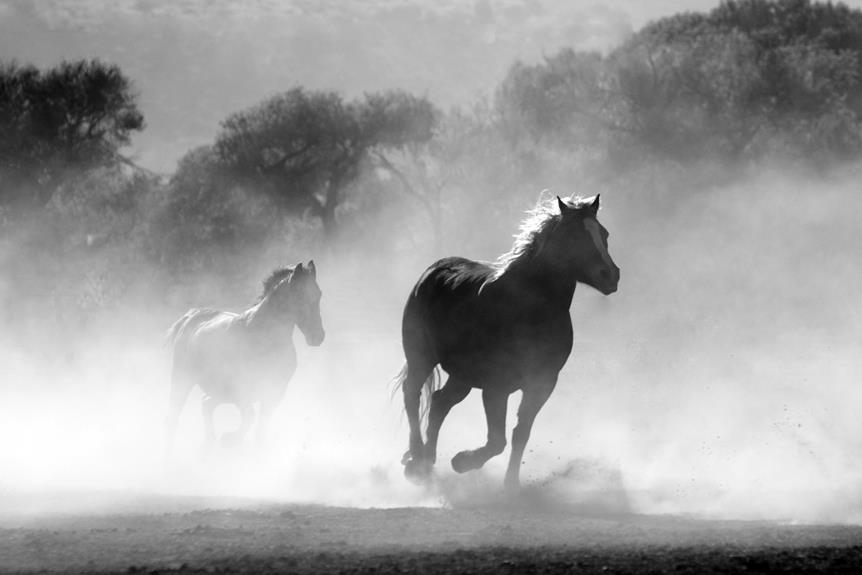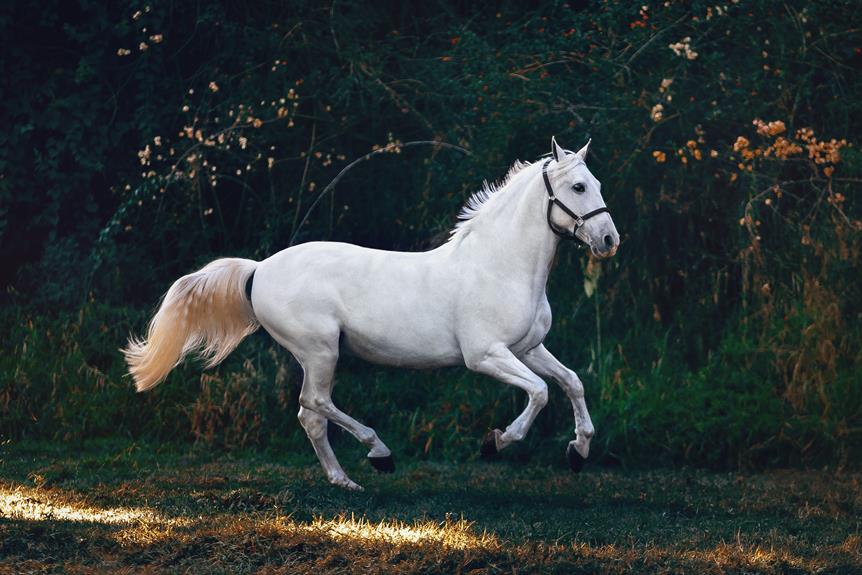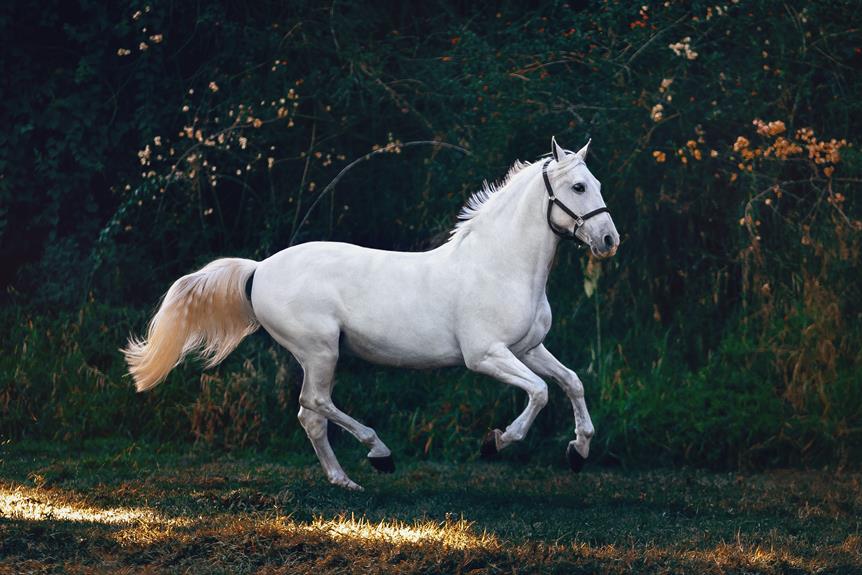Picture yourself standing in a picturesque meadow, surrounded by majestic horses grazing peacefully. You may find yourself wondering, do these magnificent creatures actually know their names? It's a question that has puzzled horse enthusiasts and researchers alike.
While there is no definitive answer, there are intriguing findings that suggest horses possess the ability to recognize and respond to their names. In this discussion, we will explore the fascinating world of equine cognition, delve into the factors that influence horses' response to names, and examine the practical implications of name recognition in horse training.
So, saddle up and join us on this quest for a deeper understanding of whether horses truly know their names.
Key Takeaways
- Horses can learn to recognize their names through training and repetition.
- Horses primarily rely on body language for communication and identification.
- Horses react differently to familiar versus unfamiliar horse voices, indicating they can distinguish individual voices.
- Name recognition improves communication and training outcomes in horse training.
The Debate Surrounding Equine Name Recognition
The debate surrounding equine name recognition centers on whether horses truly understand and recognize their individual names. While horses can learn to associate certain sounds with specific actions or rewards, there's no scientific evidence to confirm that they actually comprehend their names as a form of personal identification.
Research suggests that horses may be able to match individual humans to their voices and distinguish horses from other animals in photos, indicating a potential sense of self and individual recognition. However, their understanding of names is likely limited to associating them with certain cues or rewards, rather than recognizing them as a symbol of self and identity.
In horse care, it's important to remember that horses primarily rely on body language for communication and identification, not names. While they may react to their names due to the emotional connection they've with certain individuals or the anticipation of rewards, it doesn't necessarily mean they fully understand the concept of their own names.
Therefore, the debate continues as to whether horses truly know their names or if their reactions are simply a learned response.
Understanding Equine Cognition and Memory
Horses exhibit cognitive abilities and memory retention, indicating a level of understanding and recognition in their thought processes. Research suggests that horses can learn to recognize their names and respond to verbal cues. While they may not understand their names in the same way humans do, emotional reactions to hearing their names might indicate a sense of unique self and understanding of verbal cues.
Horses can learn to recognize their names through training and repetition. They can associate the sound of their name with a particular action or behavior, such as coming to their handler when called. This ability to recognize their name demonstrates a level of cognitive processing and memory retention.
Furthermore, horses have shown the ability to match individual humans to their voices and distinguish horses from other animals in photos. This suggests that horses can form associations between specific individuals and their vocal cues or visual representations. It indicates a level of recognition and memory that goes beyond simple stimulus-response conditioning.
While it's still unclear whether horses fully comprehend the concept of their name, their ability to respond to verbal cues and recognize familiar individuals suggests a level of understanding and cognition. Horses rely on body language and vocal sounds for communication, and names serve as practical labels used by humans for communication and administrative purposes.
Understanding equine cognition and memory helps us appreciate the intelligence and individuality of these remarkable creatures.
Factors Influencing Horses' Response to Names
Factors influencing how horses respond to their names include their previous training and experiences. Scientific research on this topic is limited, but studies suggest that horses can learn to recognize their names and react to verbal cues. They can match individual humans to their voices and distinguish horses from other animals in photos. Horses also remember each other after long separations and react differently to familiar versus unfamiliar horse voices, indicating a possible recognition of names. Emotional reactions to hearing their names might indicate a sense of unique self, suggesting a potential link between names and individual identity. Additionally, horses may have a sense of self, as they can recognize themselves in mirrors and try to rub off marks seen in mirrors, which could also influence their response to names.
To better understand the factors influencing horses' response to their names, let's take a look at the following table:
| Factors Influencing Horses' Response to Names |
|---|
| Previous training and experiences |
| Recognition of familiar voices |
| Sense of self and individual identity |
| Emotional reactions to hearing their names |
These factors play a crucial role in how horses react to their names. Horses with extensive training and positive experiences are more likely to respond to their names effectively. Additionally, recognizing the voices of familiar humans and horses can further enhance their response. A sense of self and individual identity may also contribute to horses' recognition of their names. Lastly, emotional reactions to hearing their names suggest a deeper connection between the name and the horse's understanding of its own identity. By considering these factors, horse owners can better understand how to communicate with their equine companions and meet their unique needs.
The Role of Human-Animal Bond in Name Recognition
As we explore the role of the human-animal bond in name recognition, it becomes evident that the connection between horses and their owners plays a significant part in this phenomenon. The bond between humans and horses is a unique and powerful relationship that can influence how horses perceive and respond to their names.
Consider the following points:
- Horses saw their owners as a source of comfort, companionship, and security. This strong emotional attachment creates an environment where horses are more likely to associate a name with a positive experience.
- Research suggests that horses can match individual humans to their voices. This ability to differentiate between familiar and unfamiliar voices may contribute to their understanding and recognition of their own names.
- Horses react differently to familiar versus unfamiliar horse voices, indicating that they've the ability to distinguish between individuals. This further suggests that they may be able to recognize and respond to their own names.
- The human-animal bond plays a crucial role in name recognition because it fosters trust and communication between horses and their owners. Horses are more likely to respond positively to their names when they've a strong bond with their human caregivers.
Practical Implications of Name Recognition in Horse Training
Name recognition in horse training has practical implications for effective communication and successful training outcomes. Understanding whether horses know their names can help trainers establish a stronger bond and improve the overall training experience.
When you lease a horse, knowing their name can help you call them and get their attention easily. By using their name as a cue word, you can communicate specific commands more efficiently.
Research suggests that horses can remember individual humans and differentiate them by their voices, indicating their ability to recognize individuals. This means that when you use their name, they're more likely to respond to you compared to someone else.
Additionally, horses' ability to recognize themselves in mirrors and react differently to familiar versus unfamiliar horse voices implies a sense of self. This understanding has practical implications for training as it suggests that horses may respond better to trainers they're familiar with.
When you rub the mark, by using their name, it may provide them with a sense of familiarity and trust, thereby enhancing the training process.
Frequently Asked Questions
Do Horses Recognize Their Owners?
Yes, horses recognize their owners through familiarity cues, bonding, trust, vocal recognition, nonverbal communication, training, reinforcement, emotional connection, and understanding individual horse personalities. It's a special connection between horse and rider.
How Long Can a Horse Remember You?
Horses have a remarkable memory capacity. Factors like positive reinforcement and consistent interaction can improve their ability to remember. While it varies, horses can remember you for a long time if you have built a strong bond.
Will a Horse Learn a New Name?
Yes, horses can learn a new name through training. Name recognition in other animals suggests they can differentiate between their own name and other words, with voice tone playing a role. Different breeds may vary in their levels of name recognition, and it can impact bonding with horses.
Do Horses Come to Their Name?
When you call a horse by their name, they may respond because they recognize vocal cues. Training plays a big role in teaching horses their names. Factors like familiarity and tone influence their response. Horses can distinguish between different names. Their name can impact their behavior, training, and performance. They may not have a preference for certain names.
Conclusion
In conclusion, while there's no scientific evidence definitively proving whether horses understand their names as a symbol of self, they can be trained to recognize their names and respond to verbal cues.
Horses rely on body language to identify each other, but they can also match individual humans to their voices and distinguish horses from other animals in photos.
Further research is needed to fully understand horses' perception of their names and the implications it has in horse training.



0 Comments